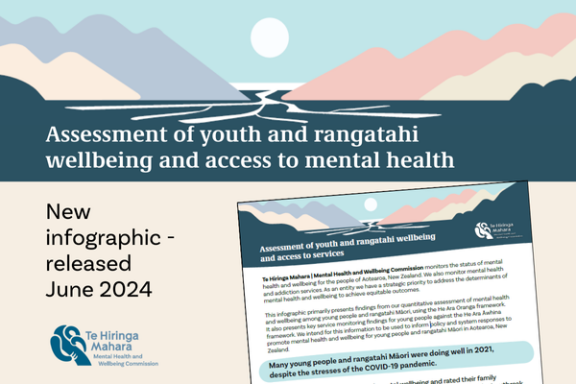Assessment of youth and rangatahi wellbeing and access to services
Published: June 2024.

We have have created an up-to-date picture of the state of wellbeing for rangatahi and young people in Aotearoa. The Assessment of youth and rangatahi wellbeing and access to services infographic was released in June 2024.
View infographic online. Download infographic (PDF 359KB). Download infographic (Word 4.3MB)
Topics covered in the infographic include rating of wellbeing, income adequacy, experience of discrimination, educational achievement, access to services and levels of psychological distress.
We did this assessment to feed into policy and system responses to promote mental health and wellbeing for young people and rangatahi Māori in Aotearoa. The aim is to promote a common understanding of strengths, challenges and opportunities facing rangatahi and young people.
This infographic primarily presents findings from our quantitative assessment of mental health and wellbeing among young people and rangatahi Māori, using the He Ara Oranga framework. It also presents key service monitoring findings for young people against the He Ara Āwhina framework.
These frameworks are designed to work together, acknowledging the critical contribution of the mental health and addiction system to achieving broader wellbeing outcomes by providing services and support where needed.
Wellbeing data is sourced from the General Social Survey (GSS), Te Kupenga (TK), the Household Economic Survey (HES), the Programme for International Student Assessment (PISA), and Ministry of Education administrative data (MoE) using datasets from 2018 – 2024.
Data used for the assessment of mental health service access was taken from Kua Tìmata Te Haerenga | The Journey Has Begun. The 204 mental health and addiction service monitoring report drew on data from Health NZ, Te Aka Whai Ora, Ministry of Health, Whakarongorau Aotearoa and other agencies.
Te Hiringa Mahara prepared this infographic report with the help and expertise of many people including rangatahi and young people driving decisions. A special thanks to our Expert Advisory Group co-chaired by Sharon Shea and Ihorangi Reweti-Peters with Dr Sacha McMeeking, Dr Jess Stubbing, Matariki Turuwhenua, Abdulla Shiblaq and Romy Lee.
